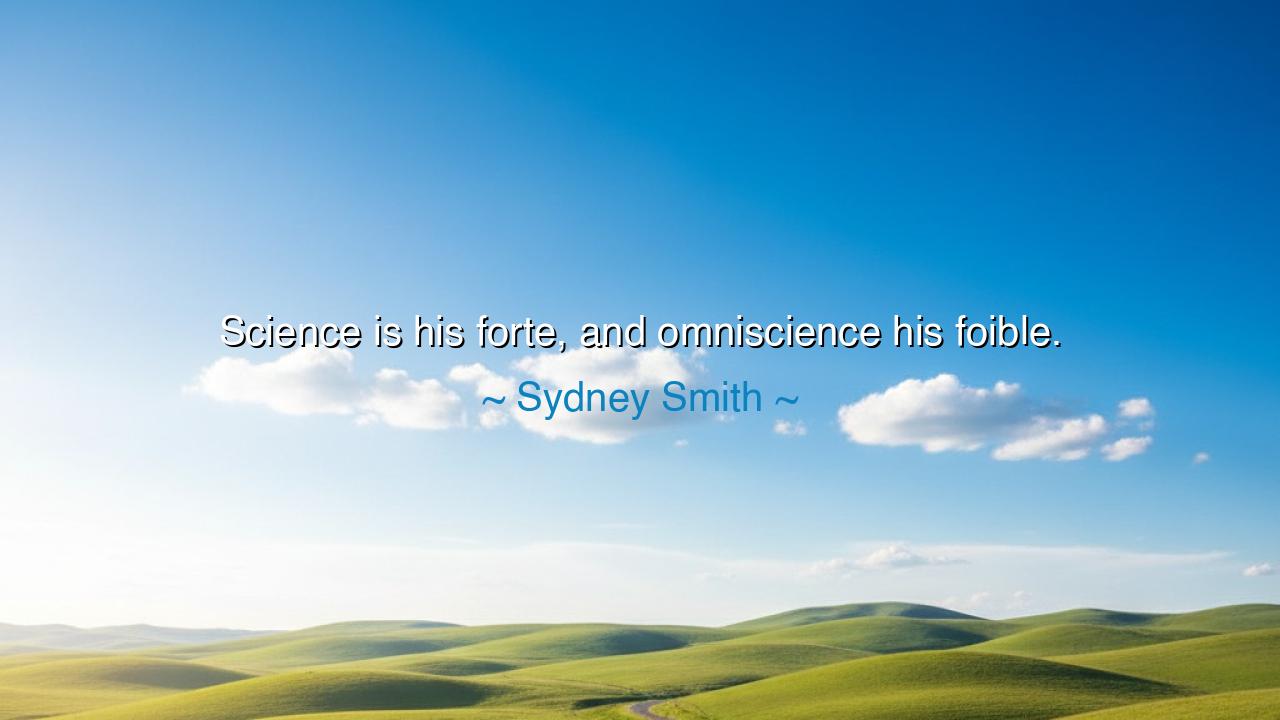
Science is his forte, and omniscience his foible.






"Science is his forte, and omniscience his foible." These words from Sydney Smith strike at the heart of a profound truth about the pursuit of knowledge. They remind us that science, when embraced fully, is a powerful tool for understanding the world, yet the desire for complete knowledge—the illusion of omniscience—is a flaw that can lead us astray. Smith's statement reveals the balance that must be struck in the pursuit of wisdom: while science provides us with the means to explore and understand the natural world, the desire to know everything, to claim ultimate understanding, is not only impractical but often dangerous.
In the ancient world, there were those who sought the truth through the rigorous application of reason and observation. Aristotle, the great Greek philosopher, was known for his deep commitment to understanding the world through science and logic. His works on biology, ethics, and philosophy laid the groundwork for centuries of inquiry. Yet even Aristotle, with all his wisdom, understood that there were limits to human understanding. The universe was vast, and human knowledge was finite. Aristotle did not claim to know everything; he was content to understand what he could, while accepting the inherent mysteries that lay beyond human comprehension. He embodied the idea that while science is a powerful means of discovery, the quest for absolute omniscience is a hubris that can blind us to the limitations of our own understanding.
The story of Icarus from Greek mythology provides another example of the dangers of overreaching in the pursuit of knowledge. Icarus, the son of the inventor Daedalus, flew too close to the sun with wings made of wax and feathers. Despite his father's warnings, he sought to conquer the heavens, only to fall when the sun melted his wings. Icarus' tragic end symbolizes the danger of overestimating one's power or understanding—especially when seeking knowledge without regard for the limitations of human capacity. The lesson here is clear: while we are capable of great things, there is a wisdom in knowing the limits of our abilities and the vastness of the unknown.
In modern times, Sydney Smith's observation still rings true. Think of the scientists and visionaries who have made remarkable advancements in fields like physics, medicine, and technology. Albert Einstein, with his theory of relativity, transformed our understanding of the universe. Yet even Einstein, in his later years, expressed frustration at the inability to unite the theories of quantum mechanics and general relativity into a single unified theory. Despite his immense intellectual prowess, he was acutely aware that there were still mysteries beyond the reach of human comprehension. His humility, in recognizing the limits of knowledge, stands as a stark contrast to the hubris of those who, like the mythic Icarus, seek to know everything, pushing beyond the boundaries of what is possible or wise.
Smith's words also remind us of the importance of humility in the pursuit of science. The pursuit of knowledge is noble, but when we begin to claim knowledge of everything, we risk losing sight of the complexity of the world around us. Omniscience, the claim of knowing everything, is an unattainable goal. There is a danger in thinking that we can master all things; rather, the wisdom lies in recognizing that science—as vast and illuminating as it is—will always be limited by the very nature of human existence. Science, when pursued with humility, can be an incredible tool for progress, but when coupled with the arrogance of assuming we know all, it becomes a dangerous force.
The lesson here, dear ones, is twofold. First, we must embrace science for the incredible gift it is—the means by which we unlock the mysteries of the world. We must use science to solve problems, to discover new realms of understanding, and to improve the human condition. But second, we must remember the words of Sydney Smith: that omniscience is a foible, a flaw that leads us astray. To claim to know everything is to fall into the trap of arrogance and blind ourselves to the vastness of the unknown. Like Aristotle, we must be content with the knowledge we have, while humbly acknowledging the limits of our understanding.
In your own life, let your pursuit of knowledge be grounded in the realization that there is always more to learn, more to discover. While you may strive to master your craft, your science, or your art, never forget that true wisdom comes from recognizing that no matter how much you know, there will always be more to learn, and there is humility in that. Science can guide us, but it is our humility in recognizing its limits that will truly unlock the potential of human progress. Let us walk forward with a thirst for knowledge, but also with the wisdom to know that some questions may be beyond our grasp—and that is not only okay, but a truth to be embraced.






AAdministratorAdministrator
Welcome, honored guests. Please leave a comment, we will respond soon